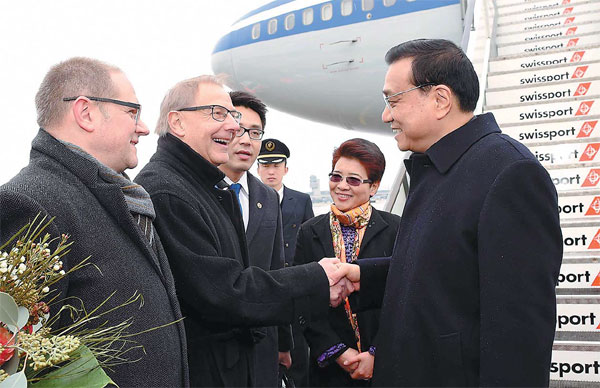Li aims for closer links with EU
China's premier finds challenges but reasons for hope at world economic forum in davos
Despite increasingly close ties with Europe, Premier Li Keqiang is on a mission to forge even stronger links between China and the fragile European economy.
Li left Beijing for Switzerland on Jan 20 to attend the annual meeting of the World Economic Forum, the first overseas trip for a Chinese leader in 2015.
|
Premier Li Keqiang arrives in Zurich, Switzerland, on Jan 20 to attend the World Economic Forum annual meeting in Davos. Rao Aimin / Xinhua |
The premier met the founder and president of the forum, Klaus Schwab, on that evening, shortly after he arrived at the Alpine town of Davos to attend the forum, which will host 2,500 delegates. On Jan 21 in Davos, Li delivered a keynote speech on the state of China's economy and its policies concerning comprehensive reform.
Li's arrival comes on the same day that China released economic data showing that the economy grew at its slowest pace in almost a quarter of a century last year. The nation's GDP grew by 7.4 percent in 2014, down from a 7.7 percent growth rate in 2013.
The 2014 growth rate fell short of the central government's estimated target of 7.5 percent.
The premier faces major challenges during his visit to Davos, one of which is the looming quantitative easing measures being prepared by the European Central Bank.
Huo Jianguo, president of the Chinese Academy of International Trade and Economic Cooperation, a Ministry of Commerce think tank, says the QE measures could be a double-edged sword for Chinese exporters.
In the short term, it may lead to a depreciation of the euro and exacerbate current obstacles in trade between China and the European Union. But Huo says that as credit lines are relaxed, especially for small and private businesses in the EU, Chinese manufacturers will likely see orders from EU countries increase.
"China's exports grew the fastest in Europe last year - higher than in Japan, the US and in emerging economies. This must be sustained. I think China may need to counteract the expected weakening of consumer demand by boosting exports to European markets," says Kamel Mellahi, professor of strategic management at Warwick Business School in Britain.
Analysts say there is huge potential for future cooperation.
"The EU needs investment, capital and increased commercial activities internally and in external markets," says Michal Krol, a research associate at the European Centre For International Political Economy. "It is not so much what needs to be done, but what shouldn't be done at the moment - I am talking about trade interference from protectionist sources that shouldn't escalate."
Numerous areas exist where China and Europe can economically complement each other, says Philip Koch, deputy director of the international department of the Hamburg Chamber of Commerce.
"In areas like urbanization, renewable energies and healthcare, Hamburg companies, as market leaders, can offer innovative concepts and solutions to China on its path toward further modernization. On the other hand, Europe can benefit from Chinese IT and telecommunication technology, as well as from innovative sectors such as e-mobility," Koch says.
"In other sectors, like the service industry, the full potential for EU-China economic relations has not been tapped."
Peter Ho, a professor of Chinese economy and development at Delft University of Technology, says the EU and China still have much to learn from each other, even while their exchanges have improved in recent years.
"China's unified and centralized system has some valuable experiences that would be useful for the EU - such as in its current efforts to prevent a new euro crisis from happening - while the EU's success in sustainable and environmentally friendly development ensuring a good quality of life for its citizens is equally valuable for China," Ho says.
Experts also note that the development of the Silk Road Economic Belt and the 21st Century Maritime Silk Road initiatives will offer vast opportunities.
Both initiatives were proposed by Chinese leaders earlier last year to create closer ties with Europe and other regions.
The proposed land-based Silk Road Economic Belt begins in Xi'an, runs through Central Asia to Eastern Europe, and ends in Western Europe. The sea-based Maritime Silk Road begins in Quanzhou, Fujian province, heads south to the Strait of Malacca, across Africa and connects to Europe.
"In this context, cooperation between China and Central and Eastern Europe is crucial."
Contact the writers through zhaoyinan@chinadaily.com.cn



















